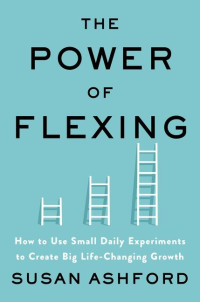Leaders who are widely viewed as effective and highly successful in their organizations will tell you that 70% of the learning that got them there was through their experiences, 20% was through other people, and 10% was through courses, books, and other types of education.

Adam Bryant, who interviewed CEOs weekly for a New York Times column, also observed the importance of learning from experiences among the CEOs he interviewed. In a talk he gave, he concluded that there is no one path to the top—but that successful CEOs make the most out of the experiences they have. Whatever they are doing, they wring meaning and learn from it.
But most of us are not good at “wringing meaning.” We often don’t learn from experiences because we’re not even truly in our experiences. We’re thinking about where we’re going or where we’ve been; we’re multitasking; we’re conversing with others by rote, without paying much attention.
In my book The Power of Flexing: How to Use Small Daily Experiments to Create Big Life-Changing Growth, I aim to help readers extract all the learning they can from the experiences they have—to wring meaning, particularly meaning about themselves, their effectiveness, and their impact on others. Here are four practices from the book to help you turn your experiences into generators for growth.
1. Manage your mindset
The psychologist Carol Dweck pointed out long ago that many people approach experiences, particularly challenging ones, with a mindset that doesn’t serve them well. They hold a performance-prove mindset and the goal to prove to everybody that they are fabulous at the task that they’re setting out to do.
This mindset, though, prevents them from learning much in that experience. They’re so caught up in proving how great they are that they don’t ask questions, because that might make them look stupid. They avoid the challenging aspects of the task, because they’re not sure they can prove that they can do them well.
If you have more of a learning mindset, you still want to perform well, but you are also attuned to learning. You are open to challenge and your focus is on getting better than you were in the past (rather than being preoccupied with whether you are better than others). People exhibiting this mindset tend to show heightened learning, reduced anxiety, and also greater resilience in the face of setbacks or challenges. You can manage your mindset as you approach a challenging experience by self-reminders and talking with friends who are similarly oriented toward learning.
2. Set a learning goal
When you have a challenging experience upcoming—running a retreat for your company or church, having a difficult conversation with a family member or roommate, heading a new team—the second step in growing your personal effectiveness is to identify a learning goal, something that is personal to you and important to have in mind as you go through that experience. Based on interviews for my book, we found three different sources of learning goals.
The pain of the present. When there’s something in your present situation that’s causing pain for you or others, it creates a motive to grow, change, or try something different. That might be a class that goes badly, a team meeting where everybody’s unhappy, or an interaction that’s awkward when all of a sudden you know something is off.
Mark was an MBA student who wanted to lead a team at McKinsey. While serving as president of a student club, he came to understand that he was a micromanager. Mark liked to have control, and people were avoiding him, and becoming disengaged from the work as a result. He knew this style of leadership wasn’t going to work at McKinsey, and so he set a goal for his growth: to work on stepping back so that other people could step up.
The fantasies of the future. We all have fantasies of our future selves. These might come from our imagination or our observation of various role models. These fantasies can create a learning goal for us. Lucy, another person I interviewed for my book, ran a small business in the wine country in California that she wanted to sell. She had fantasies about future Lucy: Future Lucy was proactive, set up her tasks, and knocked them down one by one.
But she didn’t know how to navigate complex issues around taxes, bank loans, and family estate planning. Every time she didn’t know how to do something, she just put it on the next day’s to-do list. Based on the fantasy of who she could be, she set a goal to improve at sticking with a task, even if she didn’t know how to do it initially.
Phantoms of the past. We bring with us into the world all sorts of phantoms from our childhood, lessons we learned when we didn’t even know we were learning lessons. Scholars recently have called these “family ghosts in the executive suite.” These ghosts or phantoms are beneath our direct consciousness, but affect our behavior with others in important ways. Here is one example. Growing up with five brothers and sisters, I believed there was a strong rule in our household called “Don’t bother Mom and Dad; don’t add to their burden.” Flash forward a few decades, I’m the senior associate dean, and I have to ask people for help.
 The Power of Flexing: How to Use Small Daily Experiments to Create Big Life-Changing Growth (Harper Business, 2021, 304 pages).
The Power of Flexing: How to Use Small Daily Experiments to Create Big Life-Changing Growth (Harper Business, 2021, 304 pages).
One time I thought I was being nice when asking a professor for help, by saying, “Don’t worry about it, it’s not very important, just skim it, don’t take any time on it.” His blistering email in response—stating that it was very demotivating to have someone ask for help and then tell you it’s not important—helped me to understand how lessons learned in my past were not serving me well in my current role. I wanted the people I asked for help to feel valued and appreciated, so I put this goal on my agenda: to become better at asking for help straight out without minimizing.
Notice that these goals are to work on, to improve, to get better at. As soon as you state your goals as to be great at or to be the best at, it’s very difficult to stay in a learning mindset. You want to identify goals that help nudge you to get better without becoming preoccupied with proving your greatness to others.
Your goals might be to be a better listener, be more influential, be more approachable, be more resilient, or keep your strong emotions in check. The flexing approach is just that, flexible—you can pick up a goal, pursue it, learn, drop that goal, and pick up another one. Ten years down the line, you might come back to the same goal and work on it a little bit more.
3. Conduct experiments
To grow, you need to do more than just set an intention; you need to also design and conduct small experiments—you need to try new things. The goal here is to try to do something differently to see if you can get different results. Once you set a focus for your growth, you need to identify a small experiment you could try and learn from, and then a second thing to try if the first doesn’t work so well.
In my case, I tried two things when asking for help. First I pushed myself to make requests in person so that it was harder for me to minimize and not convey appreciation to the other person. Second, when I had to do it by email because life is busy, I audited my email to see if I was minimizing. One thing I looked for was the word “just”—“I just need you to do this, I just want you to do that”—because it conveys that it’s a small, unimportant thing, and therefore not that appreciated.
Micromanaging Mark gave people very clear, deliverable specs, so he was able to let go of the process more and let people try different ways to get things done. He could do that knowing that he had been clear on the desired end result. He also physically removed himself from where the work was being done. If his club members were doing prep in a classroom for a big event, he just left and let them be.
Undone-by-unknowing Lucy committed to spending the first hour of her day on challenging activities. She also included “learn more about” on her to-do list: learn more about the tax code, learn more about the estate. This small intervention made the things she needed to do feel smaller and more doable.
4. Seek feedback to adjust
To be personally and interpersonally effective, you can’t decide on your effectiveness on your own—you need other people’s feedback. Given this, feedback and feedback seeking are integral to the growth process.
There are a couple different ways you can seek feedback. First, you can engage in direct inquiry; you can ask someone, “How am I doing on X or Y? I’d like feedback on Z.” “Do you hate this idea, boss? I want to know.”
You also can monitor the subtle (and sometimes not-so-subtle) cues people are giving off around you, and infer a feedback message. Both strategies require some thoughtfulness and care. When monitoring, it’s possible to misinterpret these feedback cues, so look for patterns. If I’m teaching a class and one student is falling asleep, it’s probably about that student; if everybody’s falling asleep, it’s probably about me, or some part of my lecture that I might want to attend to.
You might think inquiry will get you much more directly to the feedback you need, but it has a problem, as well: People often are reluctant to tell you directly that you aren’t doing well and often feel they need to tell you what you seem to want to hear.
A lot of people are afraid to ask for feedback directly; they think they might look weak, insecure, or uncertain. But according to research, it’s the opposite. It actually makes people—your boss, peers, or subordinates—see you as more effective and caring.
In my case, I directly asked for feedback. At the end of my conversation with the person I was asking to help, I would say, “It’s really important to me that the people I’m asking to help really feel like that help is valued. I’d love feedback on how you felt about that today and as we go forward, because that matters to me.”
Mark asked a friend in his club: “Do people seem engaged? I really want people to feel engaged.” He never even mentioned what he was working on, but his friend’s answers gave him the feedback he needed to adjust his behavior.
There’s nothing automatic that guarantees that you’ll gain useful insights from any particular experience. To learn and grow, it matters what you do with what happens to you. That means approaching your most important experiences with a learning mindset, bringing a specific focus on your personal growth in that experience, trying experiments, and seeking feedback.
The ability to continue to grow is a real asset both for careers these days and for a vital life. The context is changing around us so rapidly: We work in different ways, we often move around to different companies, and companies themselves are changing. Growth is needed.
Our personal lives can be equally dynamic: Life stages change—you might have been a great parent for young kids but suddenly they become teenagers, and new behaviors are required to be effective. People move around, start new jobs, retire from longstanding careers, or hope to be influential within their increasingly diverse and dynamic communities, churches, synagogues, and mosques.
If you’re not growing, it’s hard to continue to be your best self and achieve all that you want to achieve in life. The power of flexing offers a set of simple things you can do to enhance your effectiveness and to continue to grow from your everyday experiences.







Comments